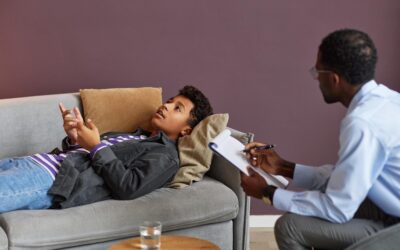Family therapy is an essential part of teen recovery at residential treatment programs. It creates a strong support system that enhances healing outcomes. When teens face mental health challenges, having their family members involved can greatly impact their recovery journey.
These structured environments provide intensive therapeutic support and include family therapy sessions to:
- Address underlying family issues
- Improve communication patterns
- Build stronger support networks
- Develop coping strategies together
Research shows that teens in residential programs have better outcomes when their families actively participate in the treatment process. Family therapy sessions offer a safe space for:
- Open conversations between teens and parents
- Resolving long-standing conflicts
- Understanding each family member’s perspective
- Establishing healthy boundaries
At Build Bright Care Group, we’ve seen how family therapy can change the recovery process for teens ages 12-17. Our evidence-based approach combines individual treatment with family involvement, creating a healing environment that supports lasting positive change. We specialize in various areas including teen depression treatment and bipolar disorder counseling, making our residential treatment program an ideal choice for families seeking help for their struggling teens.
The Impact of Family Dynamics on Teen Mental Health
Family dynamics shape every aspect of a teen’s psychological development and emotional well-being. The family system acts as a powerful influence on adolescent mental health, creating patterns that can either support or hinder recovery.
Key Family Influences on Teen Mental Health:
- Communication styles between family members
- Parental responses to emotional expressions
- Sibling relationships and interactions
- Family conflict resolution methods
- Emotional support systems at home
Parents and siblings play distinct roles in the recovery journey. Parents provide essential structure, guidance, and emotional validation, while siblings often serve as peer-level supporters who understand the family context.
Benefits of Family Involvement in Therapy:
- Creates a shared understanding of mental health challenges
- Develops healthier communication patterns
- Identifies and modifies unhelpful family dynamics
- Builds stronger support networks
- Enhances treatment effectiveness
Primary family supports become crucial elements in the healing process. When parents and siblings actively participate in therapy sessions, they learn specific tools to:
- Recognize early warning signs of mental health challenges
- Respond effectively to emotional crises
- Support healthy coping mechanisms
- Maintain boundaries while showing compassion
- Foster independence while providing safety nets
The family therapy environment allows teens to express their needs while helping family members understand their role in the recovery process. This collaborative approach strengthens the foundation for lasting mental health improvements.
In California, programs like those offered by Build Bright Care Group provide a supportive environment for adolescents to overcome mental health and behavioral challenges. We emphasize the importance of family involvement in therapy, which can significantly enhance treatment effectiveness.
Moreover, understanding how to support a teen dealing with depression is crucial for both parents and schools alike. These resources can be invaluable in helping families navigate the complexities of adolescent mental health issues.
By utilizing such specialized approaches, families can better understand their role in their teen’s recovery journey and work together towards achieving lasting mental health improvements.
Addressing Co-Occurring Mental Health and Substance Use Disorders Through Family Therapy
Mental health disorders and substance use issues often intertwine in adolescents, creating complex challenges that require specialized treatment approaches. Research shows that teens struggling with anxiety, depression, or trauma face a higher risk of developing substance use disorders as a coping mechanism.
Common co-occurring conditions in teens include:
- Anxiety disorders with alcohol use
- Depression paired with marijuana dependency
- ADHD combined with stimulant misuse
- Trauma-related disorders leading to multiple substance experimentation
Family therapy plays a vital role in addressing these dual diagnoses. Parents learn to identify warning signs, understand triggering factors, and develop strategies to support their teen’s recovery journey.
At residential treatment programs, family therapy sessions focus on:
- Understanding the Connection: Helping families recognize how mental health symptoms can drive substance use behaviors
- Breaking Negative Cycles: Teaching families to interrupt patterns that enable substance use
- Building Communication Skills: Developing healthy ways to discuss mental health and substance use concerns
- Creating Support Systems: Establishing family-based recovery networks that extend beyond treatment
The integrated treatment approach combines individual therapy, group sessions, and family involvement to address both mental health and substance use challenges simultaneously. This comprehensive strategy helps teens develop healthy coping mechanisms while strengthening their family support system.
Healing Familial Bonds: Enhancing Family Relationships Through Therapy
Family therapy sessions at residential treatment programs create a safe space for teens and their families to rebuild trust and strengthen their relationships. These structured sessions help families develop practical strategies for healing and growth:
Key Healing Strategies:
- Active listening exercises that encourage family members to understand each other’s perspectives
- Role-playing scenarios to practice healthy conflict resolution
- Setting clear boundaries while maintaining emotional connections
- Identifying and breaking negative communication patterns
- Creating shared family goals and values
Effective communication serves as the foundation for lasting family healing. Therapists guide families through specific techniques:
Communication Enhancement Tools:
- “I” statements to express feelings without blame
- Validation exercises to acknowledge each family member’s emotions
- Non-verbal communication awareness training
- Time-out protocols for managing heated discussions
- Weekly family meetings to maintain open dialogue
These therapeutic approaches help families develop new ways of relating to each other. Parents learn to balance support with appropriate boundaries, while teens gain skills to express their needs constructively. The healing process often reveals underlying strengths within the family system that can be built upon during treatment.
Family therapy sessions also address specific challenges unique to each family’s dynamics. Therapists work with families to identify triggers, develop coping mechanisms, and create personalized strategies that support the teen’s recovery journey.
Comprehensive Family Therapy Programs in Residential Settings
Residential treatment centers offer structured family therapy programs designed to create lasting positive changes in teen-parent relationships. These programs integrate various therapeutic approaches:
- Weekly Family Sessions: Regular scheduled meetings between teens, family members, and therapists to address specific challenges
- Multi-Family Group Therapy: Sessions where multiple families work together, sharing experiences and learning from each other
- Parent Support Groups: Dedicated spaces for parents to discuss common challenges and receive guidance
- Sibling Integration Programs: Specialized sessions involving siblings to rebuild and strengthen relationships
The benefits of participating in family therapy within residential settings are significant for teenagers:
- Safe Environment: A neutral space away from home allows teens to express themselves freely
- Consistent Support: Daily access to mental health professionals who can guide family interactions
- Skill Development: Teens learn practical communication and emotional regulation techniques
- Real-Time Practice: Immediate opportunities to apply new skills in a supervised setting
- Peer Support: Connection with other teens experiencing similar family dynamics
Supporting Long-Term Recovery: The Role of Family Involvement in Aftercare Planning
Aftercare planning serves as a critical bridge between residential treatment and a teen’s return to daily life. Parents and family members play an essential role in creating and implementing these plans, ensuring their teenager maintains progress achieved during treatment.
Components of an Effective Aftercare Plan
A well-structured aftercare plan includes:
- Regular therapy appointments scheduled with local mental health professionals
- Academic support systems coordinated between parents and school staff
- Clear communication protocols established for addressing potential warning signs
- Identified support resources within the community for both teens and families
How Family Involvement Enhances Aftercare Success
Family involvement strengthens aftercare success through:
- Setting consistent boundaries and expectations at home
- Maintaining open dialogue about mental health challenges
- Creating supportive routines that promote healthy habits
- Recognizing early signs of potential relapse
Benefits of Parental Participation in Aftercare Planning
Parents who actively participate in aftercare planning gain valuable tools to support their teen’s ongoing recovery. This involvement includes learning specific intervention strategies, understanding medication management, and identifying triggers that might impact their child’s mental health.
The Role of the Family Unit in Preventing Relapse
The family unit acts as a protective factor against relapse by:
- Providing emotional support during challenging transitions
- Encouraging participation in therapeutic activities
- Monitoring behavioral changes that might indicate distress
- Facilitating connections with peer support groups
Build Bright Care Group works closely with families to develop personalized aftercare strategies that address each teen’s unique needs and circumstances.
Evidence-Based Approaches in Teen Residential Treatment: Incorporating Psychoeducation for Families
Psychoeducation serves as a cornerstone in evidence-based teen residential treatment programs. This educational approach equips families with essential knowledge about:
- Mental health conditions and their impact
- Treatment methods and therapeutic techniques
- Coping strategies and stress management
- Early warning signs of relapse
At Build Bright Care Group, we integrate family psychoeducation through structured learning sessions that complement traditional therapy. Parents and siblings participate in:
Interactive Workshops
- Understanding teen brain development
- Recognizing behavioral patterns
- Learning effective communication techniques
- Developing crisis management skills
Group Learning Sessions
- Sharing experiences with other families
- Building support networks
- Practicing new parenting strategies
- Understanding medication management
Research demonstrates that families who receive comprehensive psychoeducation show improved:
- Treatment engagement
- Communication patterns
- Problem-solving abilities
- Understanding of mental health challenges
These evidence-based approaches combine cognitive behavioral therapy, dialectical behavior therapy, and family systems therapy with targeted psychoeducational components. Parents learn to identify triggers, manage crisis situations, and create supportive home environments that promote sustained recovery.
The integration of psychoeducation into family therapy sessions helps create a shared understanding between teens and their families, fostering a unified approach to treatment and recovery.
For more information on our services, including residential treatment mental health therapies for autistic children, you can contact us.
Conclusion
Family therapy plays a crucial role in helping teens recover at residential treatment programs. Involving family members creates a strong support system that goes beyond the treatment facility. Research consistently shows better outcomes when families actively participate in their teen’s healing process.
At Build Bright Care Group, we understand the importance of this connection. That’s why we offer specialized family therapy programs designed to:
- Strengthen family bonds
- Develop effective communication skills
- Create lasting support networks
- Build sustainable recovery strategies
The success of treating teen mental health issues heavily depends on the involvement and commitment of the family. When parents and siblings engage in therapy, they gain valuable insights, tools, and understanding to support their loved one’s recovery journey.
Are you ready to explore comprehensive mental health treatment options for your teen? Build Bright Care Group offers evidence-based family therapy programs in California for adolescents ages 12-17. Contact us today to learn how our specialized approach can help your family heal and grow together.












